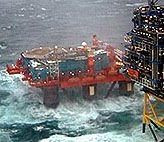
It sounds like an oil executive's vision of Nirvana: $4-a-gallon gasoline this summer and $100-a-barrel oil for the foreseeable future.
But mix in a groundswell of consumer outrage and vote-hungry presidential and congressional candidates in tight races in November, and that good dream turns bad as new laws are proposed to battle high prices and penalize the industry.
"It's a problem that's been allowed to fester for too long, and the speed at which it translates from public discord to action in Congress is going to be sudden and faster than many think," said Dave Hamilton, director of global warming and energy programs for the Sierra Club.
Already there are calls for the return of a 1980s relic — windfall taxes on oil companies' profits — including talk last week of adding the measure to a budget resolution.
And the
House Select Committee on Energy Independence and Global Warming has summoned CEOs from the big five oil companies to testify on oil prices April 1.
"It's time for these top oil company CEOs to look Americans in the face and tell them why they can't support new solutions," said Rep. Edward J. Markey, D-Mass., in a statement announcing the hearing.
But to many in the oil patch this all sounds like a broken record that no one will dance to.
"It's kind of like 'Here they go again,' " said
Dave Pursell, managing director of Tudor Pickering Holt & Co., a Houston research firm and investment bank. Congressional hearings have become a ritual whenever prices climb, he said.
But that doesn't mean anyone in the industry is discounting the passion behind these measures, he says. Gasoline is taking a bigger bite out of consumer wallets; Democrats — historically less friendly to oil companies than their GOP colleagues — are getting better at flexing their muscle in Congress; the presidential race looks close and competitive.
"At some point, people should choose their medicine while they still can," the Sierra Club's Hamilton says.
But others predict long odds against significant energy legislation getting passed this year — be it helpful or harmful to the industry.
"The fact is while there's been a lot of Sturm und Drang on the Hill about $4 gas and $8 natural gas, there's very little they can do about it," said George Baker, a partner with the law firm Williams & Jensen in Washington, D.C., who specializes in natural resources. "The rhetoric won't be matched by any real action."
Spring recess loomsFor starters, there's very little time. Lawmakers headed into a spring recess on Friday, come back for a few weeks in April and May and then go into summer recess. In all they have around 50 days to create new laws, Baker said.
That might seem like plenty of time if it weren't for the wide gap between many of the players on the best policy approaches.
The Sierra Club and other environmental groups have been pushing
renewable energy sources and efficiency measures for years, says Hamilton.
And typically they get a response from industry along the lines of the 12-point national energy plan that
Shell Oil Chairman and CEO
John Hofmeister unveiled earlier this year. The first priority: opening up more federal lands to drilling. Energy efficiency was item No. 9.
"That's the main thing you need to do, increase supplies of all energy," said John Felmy, chief economist with the American Petroleum Institute, a major industry trade group. "We need to improve conservation and efficiency too, there's no question about that, but you need market forces to do it."
Felmy said a recent House bill that proposed taking away a tax incentive from a handful of the largest oil companies and using the funds to promote renewables was "divorced from reality."
"There's no way you can argue raising the cost of producing for companies and forcing spending on untried technologies won't hurt consumers," Felmy said.
But Baker said big proposals that seek to change the fundamental supply issues, like expanding exploration off the West and East coasts "have all become political footballs."
"The two sides are really talking past each other. It's all turned into a face-off instead of working toward one common objective."
'It was about nothing'An energy bill passed in 2005 "was like an episode of Seinfeld, it was about nothing" said Pursell, the Tudor Pickering Holt executive. The bill ultimately accelerated the phase-out of MTBE, a fuel additive that was widely used to help gasoline meet regional air quality standards, because it didn't protect manufacturers from legal liability. Without MTBE the industry had to turn to ethanol, an additive that is more difficult to blend and actually reduces overall vehicle efficiency.
"It actually hurt consumers and was bad policy," Pursell said.
And the energy bill passed last December was watered down from what Democrats wanted initially, although Baker called some of the new efficiency standards in the 2007 bill "a sleeping giant" that could have big impacts in the future.
Michael Cosgrove, president of Amerex Brokers in Sugar Land, said much of the rhetoric threatens legislation that ultimately won't improve the nation's energy outlook.
Price controls like those imposed by the Nixon administration in the early 1970s generally lead to shortages because they discourage investment in new supply, he said. And penalizing profitable oil companies will only cost consumers more and encourage the firms to look elsewhere to do business.
"If you think it's unfair that Exxon makes such a profit, then buy shares of the company and get some of those benefits yourself," Cosgrove said.
Cosgrove favors laws that encourage conservation, such as the new fuel efficiency standards for U.S. vehicles that were passed in December.
But as he looked out his Sugar Land office window last week at the steady stream of SUVs driving by on U.S. 59, he mused about a decidedly non-free market solution.
"We could probably use higher gasoline taxes to get people out of their Escalades and into something more reasonable," he said. "But I'm not a fan of government taxing and then 'wisely spending' that revenue. I don't have a lot of confidence in politicians to make good long-term decisions."
 Power Finance Corporation (PFC) on Monday floated a wholly-owned consultancy arm—PFC Consulting Limited (PCL)—to advise both Central and state utilities on attracting private investments in generation and transmission projects, including award of ultra mega power projects (UMPP), in particular.
Power Finance Corporation (PFC) on Monday floated a wholly-owned consultancy arm—PFC Consulting Limited (PCL)—to advise both Central and state utilities on attracting private investments in generation and transmission projects, including award of ultra mega power projects (UMPP), in particular.







 Petroleum prices will range between $80 and $110 per barrel for the rest of 2008,
Petroleum prices will range between $80 and $110 per barrel for the rest of 2008, 










 To augment power generation and strengthen its distribution system in the state, the Haryana government has prepared a mega investment proposal of Rs 24,316.82 crore during the 11th five year plan.
To augment power generation and strengthen its distribution system in the state, the Haryana government has prepared a mega investment proposal of Rs 24,316.82 crore during the 11th five year plan. It sounds like an oil executive's vision of Nirvana: $4-a-gallon gasoline this summer and $100-a-barrel oil for the foreseeable future.
It sounds like an oil executive's vision of Nirvana: $4-a-gallon gasoline this summer and $100-a-barrel oil for the foreseeable future. Russian steekmaker
Russian steekmaker 




